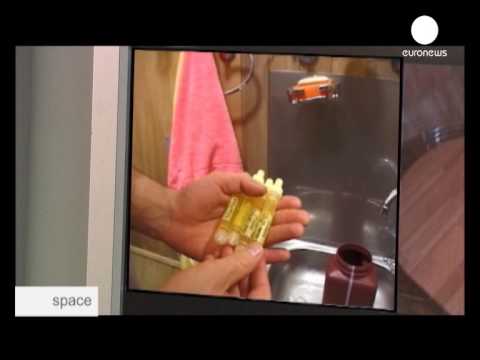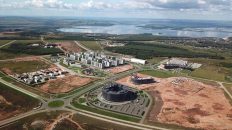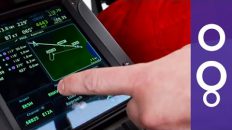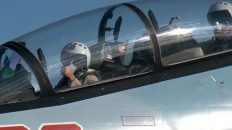Six volunteers spent 105 days in an isolation module as part of an international experiment in preparation for a manned space mission to Mars. Under constant surveillance, the all-male crew carried out 72 different experiments to gather data in readyness for a mission to Mars. All the key aspects of a long spaceship flight were simulated – barring of course the effects of weightlessness and solar radiation, which are more easily researched on the international space station.
For six volunteers, these are the last minutes of 105 days spent in an isolation module as part of an international experiment in preparation for a manned space mission to Mars.
Cyrille Fournier: “Okay, so it’s finished. 105 days of isolation.”
Under constant surveillance, the all-male crew carried out 72 different experiments to gather data in readyness for a mission to Mars.
All the key aspects of a long spaceship flight were simulated – barring of course the effects of weightlessness and solar radiation, which are more easily researched on the international space station.
Cyrille Fournier: ”On an intellectual level of course it was of course very interesting. We were participating in detailed research to provide interesting findings for the scientists. I think it’s very important for the scientific team to support the crew by providing regular feedback on the experiments.”
Oliver Knickel: “Over time, we started to enjoy the more complicated experiments that needed more preparation and which were more challenging. At the same time, some simple experiments that were repeated sometimes twice a day, became monotonous and difficult to continue.”
Samples for analysis were delivered to researchers through a hatch in the isolation module, and researchers also monitored medical data.
Dmitriy Tsarkov: ”These are air bags containing exhalation samples. We’re experimenting so as to develop an efficient non-invasive method of diagnosing diseases at an early stage.”
Scientists across Europe are calling this mission a success, although the findings have not yet been disclosed. The analysis of the data will primarily be used to prepare the next stage of the Mars-500 experiment, planned to begin in 2010 with another crew of participants.
Martin Zell: ”The experiments during the 105 days were primarily on the medical effects on the men – that is, in the psychological and physiological fields. Stress linked with cardiovascular problems, effects on the immune system. Of course, the co-operation and co-existence of people, and dietary aspects play a large role too.”
Anatoly Grigoriev: ”The main goal was to discover the potential limits of personal resources in the confined space. This explains the large number of physiological experiments. Nevertheless, the study targeted not just physical function and work abilities, but also the psychological state, so there were many psycho-physiological experiments. How are they sleeping? How are they communicating with their fellow crew members? That is small group psychology.”
Keeping the experience as authentic as possible, the videolink connecting the control centre to the isolation module was set with a time lapse of 20 minutes each way to simulate time it takes for a radio signal to bounce between Earth and Mars.
The crew had to be completely self reliant, maintaining the module and monitoring each other’s health and behaviour.
Cyrille Fournier: ”Disturbed sleep leads to changes in irritability levels. The more sleep we lost, the more irritable we became and the less perceptive to communication we became. To tell the truth, there was also the fact that I was missing my wife, obviously, and that was mostly a physiological problem – that everybody would understand!”
Oliver Knickel: ”I think the hardest part was the monotony, and the constant tension. If you think about it, at the real workplace whatever your working hours are, you can always go home at night, there are holidays, there are weekends where you can relax – and all that is simply lacking in the module. “
The study is essential for space medicine.
But the research may also help us solve problems here on Earth.
Anatoly Grigoriev: ”We’re studying a healthy man, his resourcefulness, his professional longevity, the active phase of human life. Humanity needs that knowledge to solve the issues of aging, food problems, even questions of man’s interaction with his environment.”
Looking back, the crew members say those three and a half months didn’t really feel that long – they perceived the time spent in confinement as no more than a few weeks.
Cyrille Fournier: ”There were some really great times, especially when Oliver had his 29th birthday. We celebrated that, we decorated the module with balloons. Luckily Oliver was on duty the night before, so he slept all morning. That allowed us to prepare everything for the surprise party which went perfectly.”
Oliver Knickel: “It was a great day, it was – I think – a nice change from the daily routine in isolation.”
The next and final phase of research will be five times as long and inevitably more complicated. The research module in Moscow is being prepared to welcome another international crew for a full-scale simulation of a 250-day trip to Mars, plus 20 days on the red planet and another 250 days to get back to Earth.
Martin Zell: ”Of course, we still need a lot of such studies – both on earth and under different conditions – like on the ISS, which will in any case be the first step for manned space exploration, and which is an ideal environment for the preparation of such flights.”
The first manned interplanetary mission is expected to take place sometime after the year 2030.





